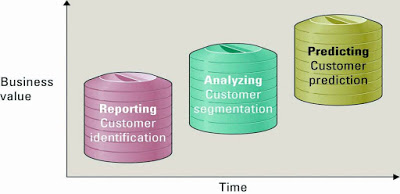Chapter 4 – Measuring the Success of Strategic Initiatives
MEASURING INFORMATION TECHNOLOGY’S SUCCESS
- - Key performance indicator – measures that are tied to business drivers
- - Metrics are detailed measures that feed KPIs
- - Performance metrics fall into the nebulous area of business intelligence that is neither technology, nor business centered, but requires input from both IT and business professionals
EFFICIENCY AND EFFECTIVENESS
- - Efficiency IT metric – measures the performance of the IT system itself including throughput, speed, and availability
- - Effectiveness IT metric – measures the impact IT has on business processes and activities including customer satisfaction, conversion rates, and sell-through increases
BENCHMARKING – BASELINE METRICS
- - Regardless of what is measured, how it is measured, and whether it is for the sake of efficiency or effectiveness, there must be benchmarks – baseline values the system seeks to attain
- - Benchmarking – a process of continuously measuring system results, comparing those results to optimal system performance (benchmark values), and identifying steps and producers to improve system performance
- Comparing efficiency IT and effectiveness IT metrics for the government initiatives
THE INTERRELATIONSHIPS OF EFFICIENCY AND EFFECTIVESS IT METRICS
- Common types of efficiency IT metrics
Efficiency IT Metrics
| |
Throughput
|
The amount of information that can travel through a system at any point.
|
Transaction speed
|
The amount of time a system takes to perform a transaction.
|
System availability
|
The number of hours at system is available for users.
|
Information accuracy
|
The extent to which a system generates the correct results when executing the same transaction numerous times.
|
Web traffic
|
Includes a host of benchmarks such as the number of page views, the number of unique visitors, and the average time spent viewing a web page.
|
Response time
|
The time it takes to respond to user interactions such as a mouse click.
|
- Effectiveness IT metrics focus on an organization’s goals, strategies, and objectives and include…
Effectiveness IT Metrics
| |
Usability
|
The ease with which people perform transactions and/or find information. A popular usability metric on the Internet is degrees of freedom, which measures the number of clicks required to find desired information.
|
Customers satisfaction
|
Measured by such benchmarks as satisfaction surveys, percentage of existing customers retained, and increases in revenue dollars per customer.
|
Conversion rates
|
The number of customers an organization “touches” for the first time and persuades to purchase its products or services. This is a popular metric for evaluating the effectiveness of banner, pop-up, and pop-under ads on the Internet.
|
Financial
|
Such as return on investment (the earning power of an organization’s assets), cost-benefit analysis (the comparison of projected revenues and costs including development, maintenance, fixed and variable), and break-even analysis (the point at which content revenues equal ongoing costs).
|
- Security is an issue for any organization offering products or services over the Internet.
- It is inefficient for an organization to implement Internet security, since it slows down processing.
· However, to be effective it must implement Internet security.
· Secure Internet connections must offer encryption and Secure Sockets Layers (SSL denoted by the lock symbol in the lower right corner of browser)
- Interrelationships between efficiency and effectiveness.
METRICS FOR STRATEGIC INITIATIVES
- Metrics for measuring and managing strategic initiatives include;
· Website metrics.
· Supply chain management (SCM) metrics
· Customer relationship management (CRM) metrics
· Business process reengineering (BPR) metrics
· Enterprise resource planning (ERP) metrics
WEBSITE METRICS
CUSTOMER RELATIONSHIP MANAGEMENT METRICS
BPR and ERP Metrics
- The balanced scorecard enables organizations to measure and manage strategic initiatives.










Comments
Post a Comment